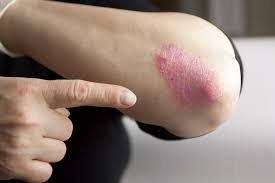Psoriasis is a chronic skin condition that affects millions of people worldwide. It can occur at any age and manifests in various forms, making it essential to understand the different treatment options available. In this blog, we will explore psoriasis treatment options for all ages, providing insights into effective management strategies and practical tips for living with this condition.
Understanding Psoriasis
Psoriasis is an autoimmune disorder that accelerates the growth cycle of skin cells. This results in thick, scaly patches on the skin that can be itchy, red, and inflamed. The condition can vary in severity and impact different areas of the body, including the scalp, elbows, knees, and lower back.

Types of Psoriasis
- Plaque Psoriasis: The most common type, characterized by dry, raised, red skin lesions covered with silvery scales.
- Nail Psoriasis: Affects the fingernails and toenails, causing pitting, discoloration, and separation from the nail bed.
- Guttate Psoriasis: Often starts in childhood or young adulthood, presenting as small, water-drop-shaped, scaling lesions.
- Inverse Psoriasis: Causes bright red, shiny, and inflamed skin in body folds.
- Pustular Psoriasis: Characterized by white pustules (blisters of noninfectious pus) and red skin.
- Erythrodermic Psoriasis: The least common type, involving widespread inflammation and exfoliation of the skin over large areas.
Psoriasis Treatment Options for Different Age Groups
Psoriasis Treatment for Children
Children with psoriasis may experience different challenges compared to adults. Treatment often focuses on minimizing discomfort and preventing flare-ups.
- Topical Treatments: Mild corticosteroids and vitamin D analogues are commonly prescribed. They help reduce inflammation and slow skin cell growth.
- Moisturizers: Regular use of emollients can help keep the skin hydrated and prevent dryness.
- Light Therapy: For more severe cases, phototherapy using ultraviolet light can be beneficial, though it is used cautiously in younger patients.
Psoriasis Treatment for Teenagers
Teenagers with psoriasis may face additional issues related to self-esteem and social pressures. Treatment aims to address both the physical and emotional aspects of the condition.
- Combination Therapy: A mix of topical treatments and light therapy can be effective in managing symptoms.
- Systemic Treatments: Oral medications like methotrexate or cyclosporine may be used for moderate to severe cases.
- Supportive Care: Counseling and support groups can help teens manage the emotional impact of psoriasis.
Psoriasis Treatment for Adults
Adult psoriasis treatment focuses on managing symptoms and improving quality of life.
- Topical Treatments: Stronger corticosteroids and coal tar products are used to control flare-ups.
- Systemic Medications: Biologics and traditional systemic medications can help manage moderate to severe psoriasis.
- Lifestyle Modifications: Adopting a healthy diet, managing stress, and avoiding known triggers can complement medical treatments.
Psoriasis Treatment for Older Adults
Older adults with psoriasis may have unique concerns, including interactions with other medications and age-related skin changes.
- Gentle Topical Treatments: Less potent corticosteroids and topical calcineurin inhibitors are often recommended.
- Systemic Treatments: Careful consideration is given to the potential side effects and interactions with other medications.
- Skin Care: Emphasis on skin hydration and protection to prevent dryness and irritation.
Natural and Complementary Treatments
Diet and Nutrition
Certain dietary changes may help manage psoriasis symptoms. Some people find relief by avoiding foods that trigger flare-ups, such as processed foods, alcohol, and certain types of dairy. Incorporating anti-inflammatory foods, like fruits, vegetables, and omega-3 fatty acids, may also be beneficial.
Stress Management
Stress is a known trigger for psoriasis flare-ups. Techniques such as mindfulness, yoga, and relaxation exercises can help manage stress levels and potentially reduce the frequency of flare-ups.
Herbal Remedies
Some herbal remedies, such as aloe vera, chamomile, and fish oil, are believed to have anti-inflammatory properties that can benefit psoriasis patients. However, it’s essential to consult with a healthcare provider before starting any new treatment.
The Role of Medical Professionals
While this blog provides a broad overview of psoriasis treatment options, it is crucial to work with a healthcare professional to develop a personalized treatment plan. Medical professionals can offer tailored advice based on individual needs and health conditions, ensuring the most effective approach to managing psoriasis.
Emerging Treatments and Research
Biologics
Biologics are a newer class of drugs that target specific parts of the immune system involved in psoriasis. They have shown promising results in clinical trials and are used for moderate to severe cases.
Gene Therapy
Research into gene therapy aims to address the underlying genetic factors of psoriasis. While still in the experimental stages, gene therapy holds potential for providing long-term solutions.
New Topical Treatments
Ongoing research into topical treatments includes developing new formulations with fewer side effects and improved efficacy.
Managing Psoriasis in Daily Life
Skin Care Routine
Establishing a consistent skin care routine is vital for managing psoriasis. This includes using gentle, fragrance-free products and avoiding harsh soaps and hot water.
Sun Protection
While moderate sun exposure can benefit psoriasis, excessive sun exposure can worsen symptoms. Using sunscreen and protective clothing can help manage the condition.
Monitoring Symptoms
Regularly monitoring symptoms and noting any changes can help in managing flare-ups effectively. Keeping a journal of triggers and treatment responses can provide valuable insights.
Conclusion
Psoriasis treatment varies based on age, severity, and individual needs. From topical treatments and systemic medications to lifestyle changes and natural remedies, numerous options are available to manage this chronic condition. Understanding these options and working with healthcare professionals can help people of all ages effectively control their psoriasis and improve their quality of life.

